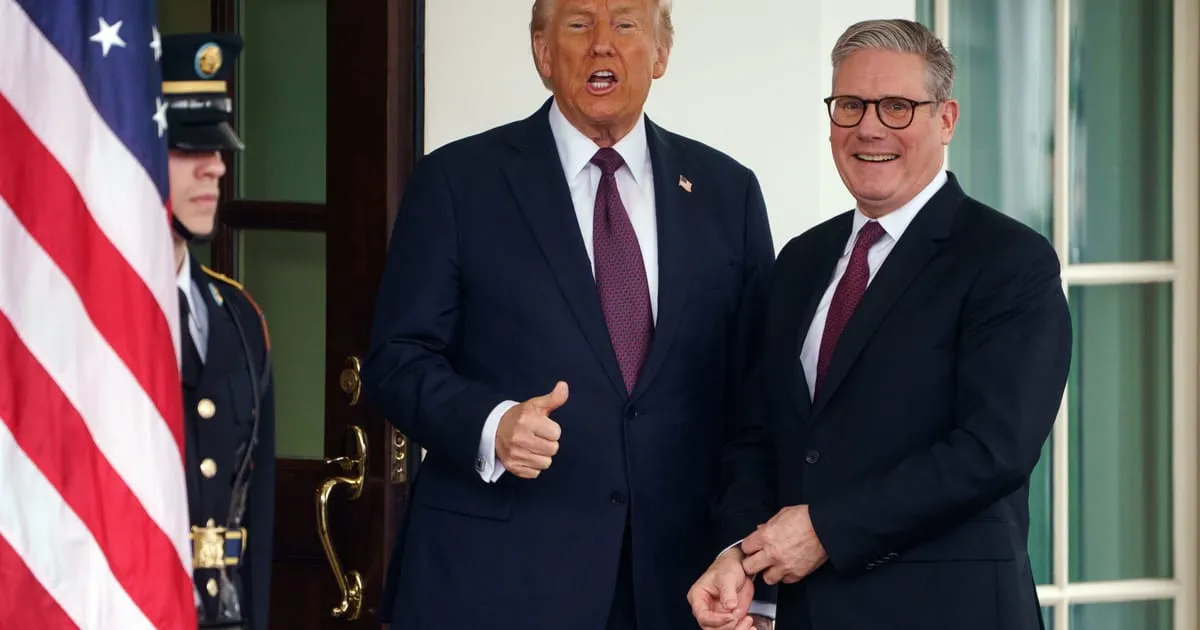
LONDON — The United Kingdom must confront uncomfortable realities regarding its defense strategy without closely examining its long-standing special relationship with the United States. As Westminster braces for the implications of the government's latest “strategic defense review,” expectations are high. This comprehensive assessment aims to identify the most significant threats facing the U.K. and develop appropriate responses.
The upcoming report is projected to allocate over £1 billion to advanced technology that facilitates quicker strategic decisions, alongside distilling military lessons from the ongoing war in Ukraine. However, when it comes to articulating Britain's role on the global stage, the task for the review’s authors, led by former NATO Secretary-General and Labour peer George Robertson, is considerably more complex.
A pressing issue the review must tackle is the fallout from Donald Trump's assertion that he would consider reducing the U.S.'s commitment to defending Europe. This potential shift poses a significant challenge to a relationship that has long been viewed as a cornerstone of British security. Prime Minister Keir Starmer, Defence Secretary John Healey, and the broader British military leadership have consistently emphasized the resilience of the transatlantic partnership during Trump's tenure, resisting any notion that the U.K.'s security calculations may be evolving.
However, some parliament members and defense analysts are sounding alarms, suggesting that this reluctance to acknowledge changing circumstances could represent a critical blind spot for the U.K. government. Nick Witney, former head of the European Defence Agency, humorously referenced the 2003 rom-com 'Love Actually,' noting, “I'm afraid the top brass never went to see it,” highlighting the gap between idealized diplomacy and current geopolitical realities.
While previous defense reviews have focused on concepts like “Global Britain” and the “Indo-Pacific tilt,” the current iteration is expected to pivot sharply back towards Europe, driven by the stark realities of the war in Ukraine. Starmer's government has acknowledged this necessity from the outset, advocating for a “NATO first” strategy. Yet, with Trump's potential return to power and his inclination to withdraw U.S. support from Europe, the geopolitical landscape is shifting once again.
Malcolm Chalmers, deputy director of the Royal United Services Institute, argues that the U.K. must reevaluate its European alliances to mitigate the risks associated with a possible American withdrawal. This reevaluation could either be a minor adjustment or signal a more radical shift in focus, potentially redirecting efforts towards containing threats such as Iran.
Patrick Porter, a professor of international security at the University of Birmingham, emphasizes that the current situation signifies a departure from longstanding defense paradigms. He notes, “Whatever it is, it's significantly different from what we had for generations,” further asserting that although these changes would have occurred regardless of Trump's presidency, he has certainly accelerated the process.
One of the SDR’s authors, Fiona Hill, a former advisor to Trump on Russia, recently expressed concerns about a “genuine rupture” in the U.S.-U.K. relationship. Despite these warnings, Porter predicts that the outcome will likely be an “untidy mix” of adapting to new circumstances while clinging to traditional alliances.
The U.K. remains heavily dependent on the U.S. for various critical aspects of its defense apparatus, including intelligence-sharing, the nuclear deterrent, and F-35 fighter jets. Mike Martin, a Liberal Democrat MP and former army officer, has called for a review of the intelligence shared with the U.S. in light of recent scandals, asserting, “When you share intelligence, you obviously want to know if these people are trustworthy.”
Another MP, who requested anonymity to speak candidly about defense matters, highlighted the need for the U.K. to publicly and privately explore what reducing its reliance on the U.S. would entail. Unfortunately, this perspective is rarely echoed among ministers or officials, who remain steadfast in their belief that the U.K. and U.S. share aligned defense interests.
U.K. Ambassador to the U.S. Peter Mandelson recently asserted that Trump’s approach might compel Europe to reassess its dependency on America, suggesting that the U.K. must balance reducing its reliance while maintaining close ties with the U.S.
Trump’s cooling stance on U.S. involvement in Europe introduces additional strategic risks for NATO allies. Witney, now a senior policy fellow at the European Council on Foreign Relations, pointed out the lack of direction in identifying where Western nations need to enhance their defense capabilities. He stated, “With the Americans having one foot out of the door, everybody is saying ‘we must take more responsibility,’ but there just is no forum.”
While many European nations, including the U.K., have announced plans to increase defense spending, coordinating decisions on how to allocate that funding remains a significant challenge. Joint initiatives have been sparse, with the U.K. currently unable to access an EU defense fund. Without a clear strategy for collaboration, the U.K. and its European allies may struggle to meet the overarching challenge outlined in the SDR: effectively countering Russian aggression in an era of shifting American priorities.